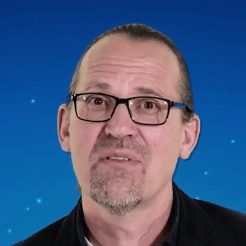Dave Coplin was Chief Envisioning Officer at Microsoft before founding his own company: The Envisioners. He tells us more about his job, his vision of the future and also about the ‘SME 2050’ report he created with Virgin Money UK.
How does one become a Chief Envisioning Officer? Can you tell me more about your background?
I never set out to be an envisioner, in many ways I just got lucky. I joined the world of work at the perfect time, a time when the personal computer revolution had just begun. This was a world where computers were distant, sometimes obtuse tools of work, to be used only for formal, professional tasks, not frivolous things like playing games or swapping faces with a favourite celebrity.
By the time I hit the world of work in the late 1980s I had unlocked my own superpower. I and a handful of other nerds had figured out not just how these incredible new machines worked, but more importantly we could work with other non-nerds to figure out how they might be applied to deliver incredible new value to organizations and individuals alike.
These were magic times, we spent our days not locked up in server rooms fighting viruses and outbreaks of ‘shadow IT’ but instead we were allowed out in the wild, standing side by side with our business leaders trying to understand their business better so we could show them how the technology could unlock even more value for them. In those days, our most challenging task was to help people engage with the technology and to try and open their eyes to the potential it had to offer.
Over time, we got complacent, frustrated even, about how hard it was to get non-believers to see the amazing potential on offer. We invented horrible terms like ‘dumb user’ and would often delight in telling people to ‘RTFM’ or ask the (sadly, still relevant) question, ‘have you tried switching it off and on?’.
We retreated to our server rooms, hid behind our security policies and IT standards and started to prefer to hang out with other believers, wanting to talk technology only to other technologists. We retreated from the ‘business’ side of our organizations and spent most of the early 2000s largely in isolation, unaware of the revolution that was quietly taking place outside the walls of the IT department.
I realized that as an industry we had become stuck in a rut, talking about technology to technologists. I was talking about new features of future products to people who also cared more about the products themselves than necessarily what the products might be used for.
In order to change this, I worked with a handful of similarly driven individuals to invent the role of the ‘Chief Envisioning Officer’, a name specifically intended to draw the satire of industry commentators and even some customers, but while the job title may have been intended to poke fun, the role most certainly was not. We were deadly serious about the opportunity that existed if only we could reconnect with where we started our careers, standing side by side with the business, helping to unlock even more value for customers and employees alike.
Our prime directive was to focus not on the technology or the process but instead to work with the business to ‘envision’ the outcome that could be achieved. At the time this represented a Copernican shift in the approach to conversations about unlocking business value with technology.
And it couldn’t be more relevant today. One of the few good things to come out of the tragic experiences of the pandemic is that we have, for the most part, completely redefined our understanding of and relationship with technology. This presents everyone with a huge opportunity to use this newfound relationship to use technology to lift our capabilities as humans, using it to help us achieve more than we could before. All we need to do is continue to help people envision a better future and then show them how the technology can make it happen.
Want to keep reading?
Create a web account to get access to more insights









